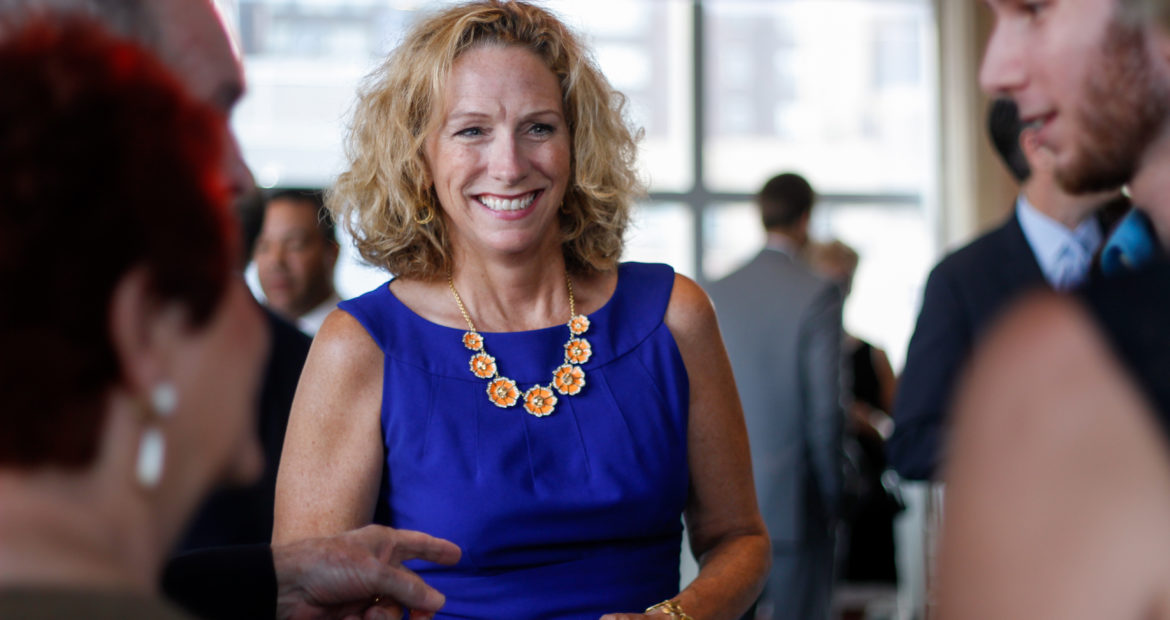
FFG: ESPN’s Beth Mowins
The Featured Football Girl series profiles fascinating women who are in some way under the NFL’s umbrella.
Beth Mowins set her career goal at a very young age. Raised in Syracuse, New York in the 1970’s. she was enthralled with all sports, including the NFL. Though she lacked allegiance to a particular NFL team –- the area was split between the downtrodden Bills, Jets and Giants — the NFL on television was blossoming into its own art form. Especially pre- and post-game shows. The Cowboys and Steelers were in the midst of dynasties, and the league as a whole produced more awe-inspiring moments, players and schemes.
The NFL Today on CBS reigned king in those days with the sharp chemistry of Brent Musberger, Irv Cross and Jimmy the Greek, but it was the show’s reporter, Phyllis George. that provided Mowins’s ‘aha’ moment.
“There was a woman talking about football,” Mowins said. “That’s what I was drawn to. I like sports and like to talk so the two blended together perfectly.”
Mowins’ dad was a local coach and teacher, which inspired an early entry into sportscasting. While just a middle-schooler, she served as a public address announcer for local high school football and basketball games. That was followed by an entry-level stint at the local Syracuse television station, SuperSports, where she worked overtime to gain knowledge of the business from higher-ups.
Her broadcasting career snowballed from there. In 1994, four years after completing grad school at Syracuse’s Newhouse, a mecca for aspiring broadcasters, she joined ESPN. For over twenty years, Mowins has been on the call for myriad events from the Women’s College World Series to college football to NCAA Championships in just about every sport. In 2015, she added to her extensive repertoire by successfully calling the Raiders preseason games. That experience all culminated in Mowins’s splashiest assignment to date: calling the Chargers-Broncos Week 1 late game on ESPN’s Monday Night Football, alongside Rex Ryan. 30 years after Gayle Sierens became the first women to call an NFL regular season game, it is Mowins turn – this time for a national audience.
We caught up with Mowins to discuss the significance of this assignment, what goes into prepping for an NFL game, dealing with social media trolls and more.
MJ: When we met during the week of Super Bowl 50, I brought up the notion of you calling regular season NFL games. You were very humble and a bit nonchalant. Now that it’s happened, please divulge: how much did you want this?
BM: We always want as good of games as we can get. The excitement and energy around Monday Night Football is something I had hoped for since I was little. I was always encouraged to aim high and see where it would take you so it’s always been on my radar. I’m just really appreciative of ESPN for his opportunity and to work with Rex, who like myself is competitive. We’re both excited about the opportunity and want to do well at it.
MJ: Obviously you getting this gig is quite empowering to women. How big a door do you think your assignment will offer other female broadcasters?
BM: I saw Gayle Sierens 30 years ago and knew that if there was a woman who could do it there might be an opportunity for me one day. My hope is to continue moving this forward and that after the game it’s not just little girls who are inspired, it’s all kids. Whether you want to be the best teacher in the world, the best parent in the world or a sportscaster. I’m just any kid out of Upstate New York who wanted to be a sportscaster and chased after it. I do understand the significance and excitement for a lot of women and hopefully that will be there on September 11th.
MJ: How did you find out and who was the first person you told?
BM: I got the call from ESPN back in March and I happened to be sitting next to my boyfriend so he was the first to hear the news. I had to stay quiet about it until some of the details were worked out and they put our team together. Just last week I started to tell friends and family. I shared the news with Mike Tirico and Sean McDonough who are friends and long time mentors of mine. They happened to be together at an event and they sent me a text video to congratulate me, so that was pretty cool.
MJ: What advice have they given you so far?
BM: ‘You got big shoes to fill so no pressure, kid.’ [Laughing]
No, they both really relied on their passion for the job and preparation leading up to their gigs on Monday Night Football and trying the best they can to rely on their training and doing the same things you would do for any other game. Approach the assignment with a lot of excitement and energy and just be yourself is first and foremost. Don’t try and do too much, just document the game and be informative and entertaining with Rex.
MJ: You and Rex Ryan worked together before at spring game. But obviously this game will have just a few more eyeballs. For many reasons you guys are being called the most intriguing broadcast pairing of Week 1. What can viewers expect?
BM: One of the expectations with Rex is that he’s going to be himself, too. He certainly has an amazing understanding of the game and an outspokenness. He’ll share his opinions with you and they’re based in a tremendous amount of experience. I’ve always considered that in the play-by-play role I take care of the who, what, when and where. He handles the how and the why. A big part of my job is to make sure I’m helping him be the best that he can be and our entire crew really from graphics and packages and replays. I call it my point guard mentality. That’s what I played when I was younger and I always try to approach these games from a team perspective.
MJ: What’s it like preparing for an NFL game vs. other sports?
BM: I’ll draw a lot on the years of college football that I’ve done. It’s more time consuming just because of the number of players involved, and it starts early in the week. You try and watch the last game you did so you continue to improve as a team. In this case it will be the opening week of the season but you still try and watch what the teams did the week before. You have your game board in front of you and you just start plugging in stats and stories and quotes. A lot of it is relying on what your analyst sees on tape and what they think the storylines might be. It’s more involved overall.
Nowadays with access on the internet you could work 12 hours a day and still not see or hear it all because you can follow local reporters on Twitter, you can dial up local sports radio in those cities and listen to what those folks are talking about. I think a big part of calling football is to gather early in the week and filter as you get closer.
MJ: Mike Tirico used to refrain from saying Washington’s nickname and other have let their societal views subtly seep into the broadcast. What is your philosophy on the play-by-play person’s role when it comes to controversies, which seem to permeate the NFL. If Chargers-Broncos is a blowout in the fourth quarter and Deflategate Part 2 just got underway would you feel a responsibility to discuss with Rex?
BM: Oh absolutely. No one has talked about any filters or anything like that. My training is old school and play-by-play and a lot of that big picture stuff, well, if the game is close and intriguing we’re calling the game and we don’t step out of the sidelines at all.
But depending what is happens and given that we’ll be at the end of opening weekend we’ll have that entire first week of games to talk about. I can’t imagine Rex would have a filter on that sort of thing either. [Laughs.]
MJ: Tirico and Jon Gruden once made smoothies in the fourth quarter of a Monday Night Football blowout, so you guys can always go that route.
BM: Actually, this time of year for the softball regionals we have like seven games in three days. When we had John Kruk working with us we he had what we called the ‘Kruk-o-matic 300.’ It was a blender for Frappuccinos to keep us going over the course of the weekend.
MJ: On to a more unsavory topic: social media trolls. Some are already saying they will turn down the sound solely based on your gender. How do you deal with that crap?
BM: I think we all want people to like us regardless of what our job is but I understood very early that with a job in the public eye and being on television you’re not going to please everybody. I got great advice from Tirico when Twitter and social media were on the rise, and that was to not engage in it. It’s hard not to see it sometimes but I try to embrace the philosophy of not having time for negative people. Life is too short and my glass is half full. That’s the way I’m going to approach this and not worry about any negative repercussions. It’s the positive people who are getting things done in life and that’s who I want to spend my time with.
MJ: What are your goals after this game? Would you prefer to still cover multiple sports or be NFL full time?
BM: Honestly, one of the important things that is really is significant to me is that I love calling the women’s championships. I think it’s great when you hear from a player at the Women’s College World Series that says, ‘I’ve been listening to you since I was 10 years old and now I’m here.’ And then they come back 10 years later and appreciate that moment in time and how we documented it for them. I think it’s important that the female athletes and student athletes understand that they’re just as big a deal. So I’d love the opportunity to call whatever they send my way.



